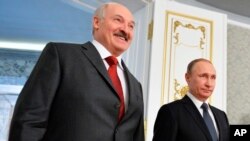Belarus does not want to have to choose between the European Union and Russia, President Alexander Lukashenko said on Wednesday during the first visit by an EU minister to Minsk since Brussels lifted sanctions against the country last month.
Lukashenko is a five-term president whose country was described in 2005 by U.S. Secretary of State Condoleezza Rice as "Europe's last dictatorship". He has a difficult balancing act trying to improve relations with the EU while keeping the country's closest ally and financial backer Russia onside.
"If the partners which we're in dialogue with try to insist that we have to choose between Russia, Poland or the EU, we don't want to be put in this position," said Lukashenko.
A peaceful presidential election in October, the release of political prisoners and Lukashenko's role in holding Ukraine-Russia peace talks in Minsk have improved ties with Brussels, which ended five years of sanctions in February.
The sanctions were imposed after the previous election in 2010 was followed by a crackdown on opposition protesters.
"We will act in a way so that no one can reproach us that there is no democracy, we will make it so that there is no less democracy here than in Poland," Lukashenko said during a visit from Polish Foreign Minister Witold Waszczykowski.
Belarus's economy shrank about 4 percent last year and its currency lost nearly half its value against the dollar as the country suffered the knock-on effects of a steep economic downturn in neighboring Russia.
Belarus is in talks with the International Monetary Fund for a $3 billion loan to shore up its currency reserves, which it will receive in exchange for implementing economic reforms.
Despite his close ties to Moscow, Lukashenko did not support Russia's annexation of Crimea in 2014 and has consistently emphasized friendly relations with the Ukraine's U.S.-backed government. At the same time, Belarus still benefits from loans and subsidized energy supplies from Russia.





